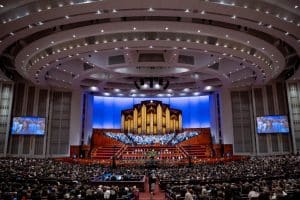 I brought an investigator to a Sacrament Meeting where the organist fell asleep at the keys twice creating loud noises during the meeting. The second counselor slept through the meeting. One speaker did an impersonation he called “Gordon B. Hinckley meets Yoda” as he spoke about Kolob. His wife said the word “poop” so many times the bishop texted us during the meeting that we should “fake a seizure” to get our investigator out. When we asked our investigator what he thought, he mentioned the word “sloppy” and he was so right. In the PEC meeting we had to fight to be allowed into, only because there were no elders to represent us, I mentioned during the missionary portion of the agenda that we should always keep in mind how we may appear to an outsider as we plan our meetings since we have so many investigators. A counselor replied to my suggestion by asking the bishop, in front of the group, “when can we get elders in here?”
I brought an investigator to a Sacrament Meeting where the organist fell asleep at the keys twice creating loud noises during the meeting. The second counselor slept through the meeting. One speaker did an impersonation he called “Gordon B. Hinckley meets Yoda” as he spoke about Kolob. His wife said the word “poop” so many times the bishop texted us during the meeting that we should “fake a seizure” to get our investigator out. When we asked our investigator what he thought, he mentioned the word “sloppy” and he was so right. In the PEC meeting we had to fight to be allowed into, only because there were no elders to represent us, I mentioned during the missionary portion of the agenda that we should always keep in mind how we may appear to an outsider as we plan our meetings since we have so many investigators. A counselor replied to my suggestion by asking the bishop, in front of the group, “when can we get elders in here?”
I was so hurt because I felt I was exhausting myself to help build their failing ward and it was met with public disdain.
– Anonymous
In one ward I served in, the bishop had previously excluded sister missionaries from PEC meetings because they were not men. We held the same calling and authority as the Elders, but because we were women, we were not welcome. He thankfully reconsidered his position around the time I got there, but I always felt like an intruder in PEC after that and had a burst of anxiety that my voice was not welcome any time I needed to speak.
– ElleK
“Are the sisters allowed to be here?” —a ward mission leader said this about me and my companion after letting the elders walk into a leadership meeting. We were all missionaries serving in that ward, we all had items to discuss in that meeting, but my presence was questioned.
– Carmen Sophia Cutler
For me the exclusions and silencing have been fairly subtle but clearly part of the built-in system that doesn’t include women as agents in the church. For instance, the times I felt silenced and invisible the most were on my mission when I was surrounded by male leaders and given lesser authority and responsibility simply because I am a woman. I was a sister training leader for a good portion of my mission, but even within that leadership position I felt powerless. There was nothing I could do that wasn’t already done by a male leader. I felt redundant and I knew that if I left or my leadership position disappeared, the mission would continue functioning just as it had.
– Julia Larson
Sister Training Leaders, though supposedly equal to Zone Leaders, were consistently given less time at meetings to speak. The Zone Leaders conducted the entire meeting and spoke the remainder of the time that they didn’t assign to other missionaries. Their section was always two to three times longer than the sisters’ and they usually covered the main theme while the STLs covered an appendage of that theme.
– Chloe M.
Pro Tip: Female missionaries hold the same calling and position as male missionaries, and their input and inspiration is every bit as valid.
Click here to read all of the stories in our #hearLDSwomen series. Has anything like this happened to you? Please share in the comments or submit your experience(s) to participate in the series.
“If any man have ears to hear, let him hear.” (Mark 4:23)






8 Responses
Speaking as an RM and a woman, sisters aren’t considered real missionaries.
Yeah, it’s pretty telling that Elders are called “missionaries” and sisters are called “sister missionaries.”
Since we have a companionship of each in our ward we generally just say the sisters or the elders to differentiate. If someone said, “the missionaries” anyone in our ward would ask “which ones?” the only differentiation is gender. And, for the most part, most units in the UK would much rather have sisters than elders – because they are the best missionaries by far.
I was a missionary before the age requirement changed, and what was even more disturbing is how the boy missionaries’ title “Elder” made them appear more manly and mature than they actually were, so it garnered them so much respect, when in reality we sisters were lder, wiser, and did most of the baptism and were much more obedient than the so-called “elders” who were put in charge of us. It was insulting! we actually deserved the title elder because we were the eldest of the mission!
But no, we were the “girl” missionaries according to mission language, and the little boys in our midst got to me “elders.” And this was reflected in the way we were treated by members, leaders, and mission leadership alike
I’ve started calling the male missionaries “brother missionaries”. It makes things so much clearer.
I love it, Moss! Way to push back on the idea of men as the default!
I’m saddened but not in the slightest surprised that “sister training leader” is an empty gesture. I served before that calling existed and women had absolutely no leadership possibilities, empty or otherwise. We never attended a mission leadership meeting, no one ever reported to us and we never organized a conference. At one point the mission president decided to have a “sisters conference” that would happen concurrently with the missionary leadership conference. On one hand it was really nice to have an opportunity to see other sister missionaries, because often we’d be the only set in our zone and wouldn’t see our peers until the next transfer, if then. But my main memory is that the zone leaders recited the Relief Society theme for us, which they had memorized, as a gesture to caring about our needs. It was kind of a nice idea, but also sort of annoying that the meeting was planned and run by two elders who also had to dart back to the real meeting that was happening in the chapel at the same time.
At no point in my life has it been clearer to me the relative position of women in the church than on my mission. It was a feminist awakening for me, though at the time I wouldn’t have termed it as such. I realized that I had felt less-than in my singles ward not because I hadn’t served a mission while all my guy friends were RMs (they’re so wise! So spiritual! So confident! Their comments are so welcome!). I thought that serving a mission would put me on equal footing when I returned. It did in scriptural knowledge and self-confidence, but I had become deeply aware of my own secondary importance and complete lack of decision-making power.
We had a returning Brother Missionary give his homecoming talk last Sunday and he spoke about how on his mission the Sister Training Leaders actually conducted trainings for male AND female missionaries! I wanted to stand up and cheer!